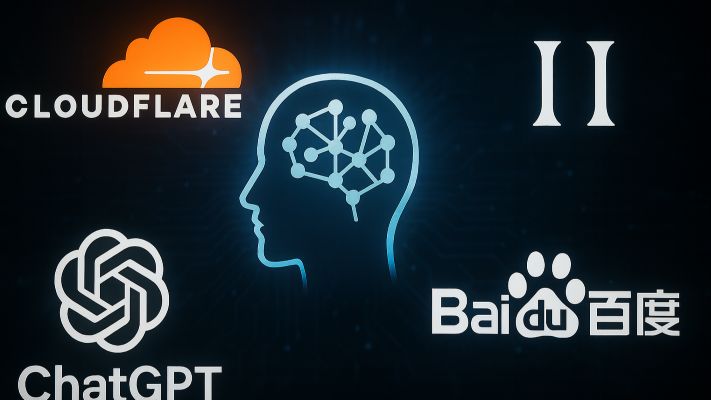AI Navigation
- articleAI Trends
- lightbulb_2AI Tips
- assistant_navigationAI Navigation
- heatHot Articles
- emergency_heat_2Hot Tips
- format_list_numberedPrompt Formatter
- psychologyTest Center(RPI)
November 19, 2025 · 24-Hour AI Briefing: Cloudflare Outage Shakes the Internet, Google Unveils Gemini 3 Pro, Baidu’s AI Growth Accelerates
Over the past 24 hours, the global AI and tech ecosystem experienced major turbulence. A massive Cloudflare outage disrupted countless internet services worldwide, while Google and Baidu continued pushing forward with significant AI advancements. This edition of the AI Briefing highlights the most critical events and provides in-depth commentary.

1. Cloudflare Configuration Error Causes Global Outage
Summary:
A database permission misconfiguration at Cloudflare triggered a global outage, affecting a large number of services including ChatGPT, Sora, X, Claude, Perplexity, and Zoom. Cloudflare CEO Matthew Prince issued a public apology and promised to release a detailed post-mortem report. The company confirmed there was no indication of a cyberattack.
Commentary:
This incident reveals a long-overlooked systemic risk: the internet is dangerously dependent on a handful of centralized infrastructure providers.
Cloudflare powers DNS, DDoS protection, and edge services for more than 10% of global websites—including nearly every major AI company (OpenAI, Anthropic, xAI).
A single human configuration error taking down the world is not an engineering failure — it’s a failure of centralization.
The internet’s backbone must evolve toward being more distributed, more redundant, and more verifiable.
This outage may also accelerate the emergence of a strong new competitor to Cloudflare.
2. Google Launches Gemini 3 Pro and Expands DeepMind’s Research Footprint in Singapore
Summary:
Google officially released Gemini 3 Pro, its most advanced AI model to date, delivering major improvements in multimodal processing, mathematical reasoning, and long-context understanding.
DeepMind simultaneously announced a new AI research lab in Singapore, focusing on education, healthcare, and scientific collaboration across Asia.
Commentary:
Gemini 3 Pro’s capabilities show Google’s continued strength in data, algorithms, and compute scaling. More importantly, the model now demonstrates the ability to decompose tasks, call external tools, and self-verify, marking a shift from passive responding to active reasoning.
DeepMind’s expansion into Singapore is strategically significant.
By focusing on education, medicine, and science—long-cycle, high-value fields—Google is building a durable moat rather than simply chasing consumer-grade AI speed.
Google is strengthening its foundation models while simultaneously building global AI ecosystems across key regions.
3. Baidu Q3: AI Revenue Surges 50%, Robotaxi Leads the World
Summary:
Baidu reported strong Q3 2025 results:
-
AI business revenue up 50% YoY
-
AI cloud +33%
-
AI applications revenue: 2.6 billion RMB
-
AI-native marketing revenue up 262% to 2.8 billion RMB
-
Over 100 billion RMB invested in AI cumulatively
-
Apollo Go’s fully autonomous rides now exceed 250,000 per week, with 17 million+ global rides (industry-leading)
Commentary:
Baidu is transitioning from a traditional internet company to a dual-engine business powered by AI infrastructure + autonomous mobility, and it’s finally entering a return phase.
Growth is happening across all AI segments — cloud, applications, and marketing.
Few Chinese companies can sustain AI investments above 100 billion RMB, and Baidu is one of them.
On autonomous driving, Baidu’s massive real-world operational data gives it a training flywheel that is unmatched by most global competitors.
This leadership is supported not by marketing slogans, but by verifiable numbers.
However, Baidu also faces intense competitive pressure:
-
Search is continuously eroded by WeChat, ByteDance, and Alibaba
-
The Wenxin (ERNIE) model competes against DeepSeek, Doubao, and Tongyi
Baidu is gaining momentum, but the competitive battlefield is equally accelerating.
📌 Further Reading
(Linked directly through the titles; no standalone URLs.)
Conclusion
The past 24 hours remind us that while AI capabilities continue to advance at breakneck speed, the global infrastructure supporting them is still fragile.
The next phase of competition will not only be about model performance or compute scale — but also about resilience, decentralization, and long-term ecosystem building.